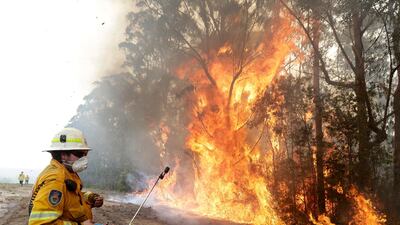With each day that the bushfires rage on in Australia, the scale of destruction becomes more evident. At least 26 people have died, including four volunteer firefighters. The world has seen images of skies thick with smoke, burnt trees and firefighters combating flames that have razed at least 2,000 homes, rendering inhabitants homeless as they tore across more than eight million hectares of land.
The catastrophe has only worsened in the past few weeks. The fires have claimed the shocking figure of one billion animals and endangered the biodiversity of an entire nation. On social media, people have shared images of kangaroos, koalas and other marsupials lying lifeless across large swathes of burnt land. Ecologists say at least tens of thousands of koalas have died. All seven states and territories of the world’s driest inhabited continent are affected. To make matters worse, there will be no let up in the coming weeks. Authorities have urged Australians to prioritise their safety and leave parts of the eastern states of Victoria and New South Wales. Some residents, overcome by the sight of their former homes, now gutted, have described these bushfires as the worst period of their lives.
When a state of emergency was announced last month, Australia had witnessed its highest ever temperature of 41.9° C. While the Australian government has pledged $2 billion (Dh5bn) over two years to help recovery efforts, the international community has risen to the occasion and offered help.
Sheikh Mohamed bin Zayed pledged vital support to Australia. In a tweet, the Crown Prince of Abu Dhabi and Deputy Supreme Commander of the Armed Forces wrote: “During a phone call with the Australian prime minister I discussed efforts to fight bushfires in the country and I assured him of the UAE’s readiness to provide various types of help.”
People from all across the world, moved by the sheer magnitude of the catastrophe, have donated what they can. Some volunteers have sewn wraps for young marsupials including koalas, wombats and possums that require pouches to grow without the nurture of their mothers. Wildlife rescuers are dependent on compassionate donors to stitch items like mittens for the burnt paws of koalas.
The United Nations World Meteorological Organisation has said that the smoke from Australia's bushfires has blown across the Pacific and turned grey the skies over Chile and Argentina, and might have even reached the Antarctic. Even for a country that periodically sees bushfires and drought, these fires that began in September have wreaked unprecedented damage.
This season of wildfires is likely to change Australia forever, its topography as well as its environment policies. Australia’s bushfires have emitted about 350 million tonnes of carbon dioxide, equal to two-thirds the country's annual emissions from man-made sources. Climate Analytics, an advocacy group that tracks climate data, says the country is one of the highest per-capita emitters of carbon dioxide in the world.
The gutted topography of Australia, the loss of homes and the sight of thirsty koalas gulping down water from the water bottles of cyclists should drive policymakers to examine the extent to which this crisis is determined by climate change. If anything positive is to emerge from this devastation, it should crucially include being better prepared for the future when another of these calamities might strike.

